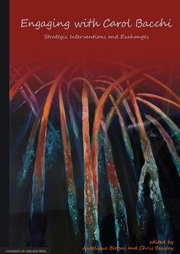Book contents
- Frontmatter
- Contents
- Acknowledgements
- List of Contributors
- Introduction
- Part I Looking back: On beginning
- Part II Strategic interventions and exchanges: Reflections and applications of the ‘What's the Problem Represented to be?’ approach
- 2 Introducing the ‘What's the Problem Represented to be?’ approach
- 3 Women, Policy and Politics: Recasting policy studies
- 4 Spaces between: Elaborating the theoretical underpinnings of the ‘WPR’ approach and its significance for contemporary scholarship
- 5 Digging deeper: The challenge of problematising ‘inclusive development’ and ‘disability mainstreaming’
- 6 Answering Bacchi: A conversation about the work and impact of Carol Bacchi in teaching, research and practice in public health
- 7 Located subjects: The daily lives of policy workers
- Additional interventions: Select reading list
- Part III Strategic exchanges: The wider context
- Part IV Looking forward: Still engaged
4 - Spaces between: Elaborating the theoretical underpinnings of the ‘WPR’ approach and its significance for contemporary scholarship
from Part II - Strategic interventions and exchanges: Reflections and applications of the ‘What's the Problem Represented to be?’ approach
Published online by Cambridge University Press: 05 June 2013
- Frontmatter
- Contents
- Acknowledgements
- List of Contributors
- Introduction
- Part I Looking back: On beginning
- Part II Strategic interventions and exchanges: Reflections and applications of the ‘What's the Problem Represented to be?’ approach
- 2 Introducing the ‘What's the Problem Represented to be?’ approach
- 3 Women, Policy and Politics: Recasting policy studies
- 4 Spaces between: Elaborating the theoretical underpinnings of the ‘WPR’ approach and its significance for contemporary scholarship
- 5 Digging deeper: The challenge of problematising ‘inclusive development’ and ‘disability mainstreaming’
- 6 Answering Bacchi: A conversation about the work and impact of Carol Bacchi in teaching, research and practice in public health
- 7 Located subjects: The daily lives of policy workers
- Additional interventions: Select reading list
- Part III Strategic exchanges: The wider context
- Part IV Looking forward: Still engaged
Summary
This chapter reflects upon Carol Bacchi's (1999; 2009) ‘What's the Problem Represented to be?’ (‘WPR’) approach to policy analysis, commenting in particular on the wider theoretical underpinnings of the approach, and the influence that both had upon my doctoral thesis. The ‘WPR’ approach takes an innovative and important theoretical orientation to policy studies and to critical analysis more generally. Of central concern in this chapter is the way that the ‘WPR’ approach side-steps, avoids, and challenges taken-for-granted approaches to ‘problem solving’ as well as its rejection of the idea that problems exist ‘out there’ to be stumbled upon. It is in the context of these analytical moves, elaborated below, that the ‘WPR’ approach insists that modes of acting are contingent upon ways of knowing and that, connectedly, to reflect critically upon a subject is a political act. Considering understandings of knowledge, critical analysis and scholarship more widely, the chapter also addresses the ways in which the critical impulse central to Bacchi's scholarship sits in a tense relationship with orthodox understandings of scholarship.
This last point recalls the title of the chapter, ‘Spaces between’. I aim to deploy the metaphor of space to imply a variety of meanings. Space can be understood as distance, and as a metaphor can signal conflicts and contrasts in the ways we understand the world, competing meanings and distinct world-views. The metaphor of space as distance—and connectedly the challenge of distances to be travelled—thus raises the question of how we find our way from one viewpoint to another, and the further question of whether all conceptual distances can be traversed. Are there spaces—conceptual distances and differences—that cannot be reconciled, sites over which there is no meeting point? Should it be regarded a bad thing if this is so? Where I discuss the space between the understanding of critical scholarship practice developed in Bacchi’s work and that prevalent in orthodox understandings of scholarship I suggest that perhaps this constitutes an instance of insurmountable conceptual distance.
- Type
- Chapter
- Information
- Engaging with Carol BacchiStrategic Interventions and Exchanges, pp. 37 - 52Publisher: The University of Adelaide PressPrint publication year: 2012
- 17
- Cited by



